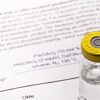Taking certain medications may prevent the emergency contraceptive pill — better known as the “morning after pill” — from working properly. The Medicines and Healthcare Products Regulatory Agency (MHPRA), the United Kingdom’s version of the FDA, is warning that certain drugs used to treat epilepsy, tuberculosis, HIV and fungal infections may interact with Plan B One-Step (levonorgestrel) and Ella (ulipristal), making those 2 drugs less effective. The MHPRA also says that using the supplement St. John’s wort may also interact with the 2 drugs. The agency is also suggesting that women who have used those medications that may interact with emergency contraceptive drugs in the last 4 weeks use a copper IUD (intrauterine device) for emergency contraception. Posted September 15, 2016. Via MHPRA.
Oral syringes are better than measuring cups when giving children liquid medicine as parents are less likely to make dosing errors. Parents were 4 times as likely to measure an incorrect dose using a measuring cup compared to a syringe, according to new research published in Pediatrics. Overall, nearly 85% of the 2,110 parents included in the study made at least one error when asked to measure 9 different amounts of liquid medicines using a dosing cup or oral syringe. In addition, 1 in 5 parents measured a dose that was twice as much as specified. The researchers concluded that oral syringes are preferred over dosing cup, especially for smaller doses. Posted September 12, 2016. Via Pediatrics.
The FDA has launched a competition to develop an app that could help reduce the number of opioid overdose-related deaths. The idea for the app is to connect opioid users with nearby locations where the drug naloxone, an antidote for opioid overdose, can be found. Timely administration of naloxone is critical to reverse the overdose and prevent possible death. Although only available by a prescription, a number of states many states have taken measures to provide the drug to first responders, community-based organizations, and even friends and family of the user. About 28,000 people died in 2014 from overdoses of prescription and illicit opioids. Posted September 19, 2016. Via FDA.





